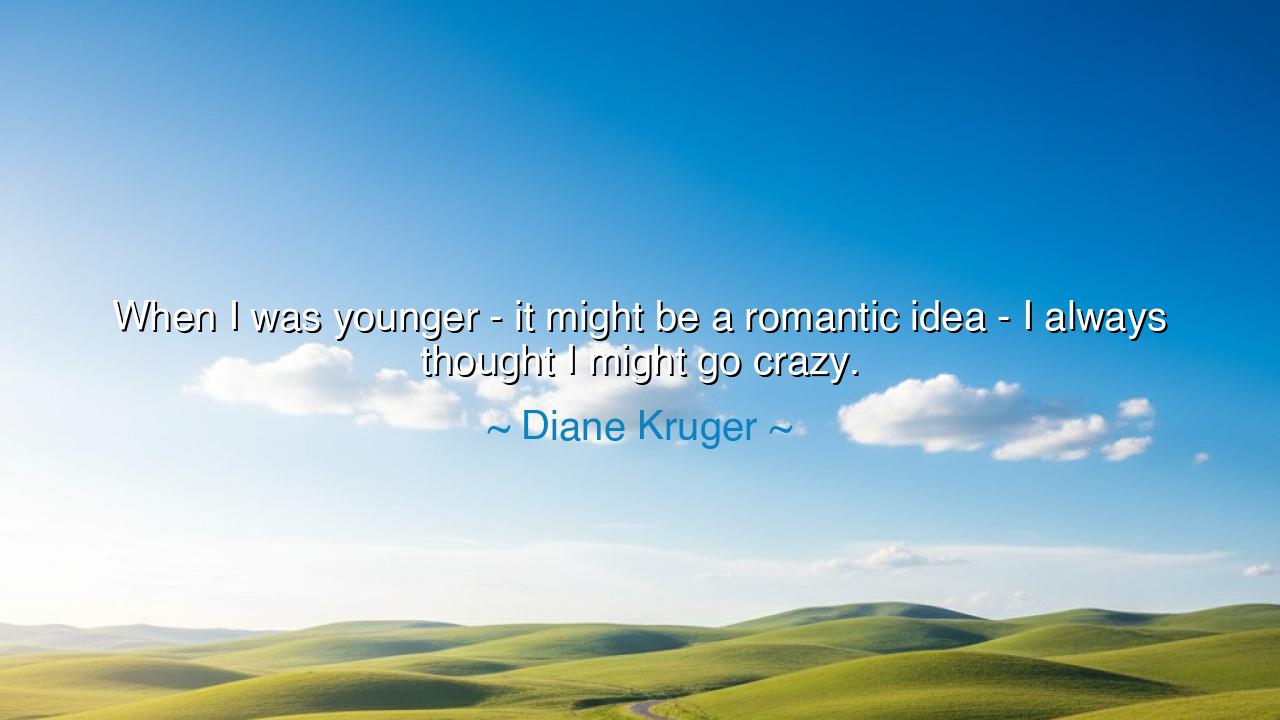
When I was younger - it might be a romantic idea - I always






Hear now the words of Diane Kruger, a voice that, though speaking of youth, touches upon a deeper, universal truth. "When I was younger," she says, "I always thought I might go crazy." These words, spoken with an honesty that rings through the ages, carry with them the weight of the human condition—that delicate balance between the dream of becoming something more and the fear of being consumed by the forces within and around us. It is a feeling that many of us, in our youth, have held in our hearts: the turbulent and often overwhelming urge to break free, to shatter the mold and let the wildness of our being take over. It is a romantic idea, indeed, this notion that we might lose ourselves, not out of weakness, but out of the sheer intensity of our emotions, our desires, our passions.
The idea of going crazy is not one of madness alone, but of release, a yearning to cast aside the constraints of society and expectation. In youth, we are often filled with wild dreams, visions of ourselves unbound, living life with abandon. We fantasize that to lose control might be the ultimate act of freedom. We imagine that sanity, with all its rules and limits, is a prison—a cage in which our true self is confined. And so, we dream of breaking free, of experiencing life without restraint, without the weight of reason holding us back. This, perhaps, is the essence of the romantic ideal: the belief that in chaos lies truth, that to unravel oneself is to discover the deepest form of being.
But, as Kruger admits, this idea of going crazy is often more a romantic fantasy than a reality. For as we age, we come to understand that sanity, in its truest sense, is not a prison, but a foundation—the very thing that allows us to reach for the stars without falling into the void. Sanity does not mean the absence of passion or wildness, but rather the ability to channel and focus those energies in ways that bring us closer to our goals and our truths. The crazy dream of youth, though powerful and evocative, often fades as we realize that there is much more to life than the fleeting thrill of unrestrained abandon.
In the ancient world, the story of Socrates comes to mind. He, too, was a man who was often called to the edge of madness by the society in which he lived. He did not, however, give in to this call. Instead, he embraced his philosophical madness, his unwavering commitment to questioning, to seeking truth. Socrates believed that true wisdom came not from abandoning reason, but from understanding the tension between reason and passion. His life was a balance, where his deep, burning questions about the nature of life were always tempered by a commitment to sanity and self-control. In his case, the very thing that some might have called "crazy" was actually the most focused, disciplined form of intellectual pursuit.
Kruger’s words remind us that we must not mistake the romantic fantasy of wildness for the true freedom that comes with understanding and self-mastery. The lesson here is that we should not fear the restraint of reason, for it is through the careful guidance of reason that we are able to truly flourish. Just as the tree does not grow wild and untamed, but reaches its fullest form when its roots are firmly grounded in the earth, so too must we find balance between the wild passions of our youth and the wisdom that comes with age.
Consider the story of Vincent van Gogh, a man whose intense passion and desire to express the innermost depths of his soul led him to the edge of madness. In his letters, he often spoke of his fear that he might be consumed by his own mind—that his passions might drive him to insanity. And yet, in the very moments when he seemed most unhinged, his paintings captured the most profound beauty. Van Gogh was, in a sense, both the embodiment of romantic idealism and the tragic realization that such intensity, when untamed, can lead to suffering. His story teaches us that the balance between creativity, passion, and sanity is delicate and must be carefully navigated.
And so, O wise ones, let us take Kruger’s words as a lesson in self-awareness. Youth may tempt us to follow the wild path of recklessness, to believe that to be unrestrained is to be free, but in truth, freedom comes not from abandoning the self, but from embracing it in its full complexity. Do not fear the control that reason and wisdom bring, for it is through these that you will find the strength to achieve the dreams that ignite your soul. The romantic ideal of going crazy is, in many ways, a myth—a fleeting fantasy of a mind that longs to escape. True freedom lies not in abandoning reason, but in finding a way to live with passion and wisdom in harmony.
In your own life, remember this: the wildness of your heart, the passions that burn within you, are not to be feared. Embrace them, but let them be tempered with reason and discipline. Do not let your dreams lead you astray, for it is the steady hand of wisdom that will guide you through the storms of life. The balance between passion and sanity is the key to living a life of both fulfillment and peace.






AAdministratorAdministrator
Welcome, honored guests. Please leave a comment, we will respond soon